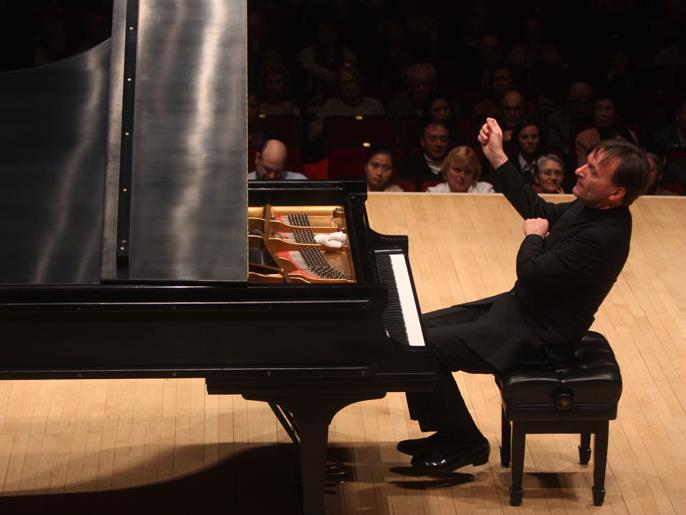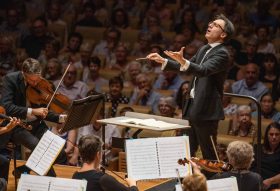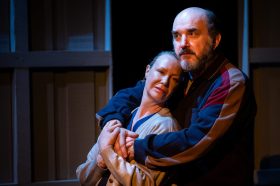Photo by Hiroyuki Ito via www.stephenhough.com
Returning to Australia for his third, solo national tour for Musica Viva Australia, and on this occasion unfortunately battling a cold, Stephen Hough (pronounced ‘huff’) presented himself once again as a master musician projecting an assured professionalism and clarity of understanding of the repertoire performed. His technique, as fresh as ever, attended to a disciplined responsiveness to detail, favouring delineation of structure and precision of phrasing over flamboyant display. I found the selection of works fascinating: four quite different Roman Catholic composers contributing works which portrayed a journey from darkness to light in the manner of the great Holy Week liturgies of the Christian faith.
Schubert’s desperate A minor Sonata, D784 opened the proceedings followed by the heady and enticingly self-indulgent Prélude, Chorale et Fugue by César Franck. From the rare to the rarer we then moved on to hear one of the first Australian performances of Hough’s own Piano Sonata III ‘Trinitas’ composed just last year (a commission from journal The Tablet) followed by four works by Catholic devotee, Franz Liszt.
Schubert’s 14th Sonata is both considered the first mature work in the genre and a composition of tragic significance. Having experienced a year of ill-health, the composer was advised that his life was now in serious danger; he died five years later, aged 31. This work dates from a time when the composer was just mastering sonata form; it would seem to struggle within the confines of this structural jacket. The composer’s stress and anxiety facing an uncertain future is further portrayed in the work’s opening movement (Allegro giusto) through stark, bare octaves, and a repeated sighing motif. The performance was certainly clean, detailed and intelligently outlined although I felt it sidestepped the emotional intensity necessary to carry across its innate despair, instead maintaining a countenance of innocence and reticence.
High Romantic French composer, César Franck is better known for his organ compositions written as titulaire of the colossal Neo-Gothic Sainte-Clotilde, Paris than for his few piano compositions; the title of this work reflects his connection to this grand ecclesiastical aesthetic. Favouring cyclic form across movements and inwardly spiralling chromatic harmonic language, the work also speaks of a sincere and rich mysticism; a waft of the numinous. But again, I wished for more from the artist on this occasion as the performance seemed to stand at a distance from its deeply sensual, perhaps even hedonistic core.
These days it is unusual indeed to hear a substantial composition by the artist performing his own work, though this, of course, was standard practice in centuries past (Bach, Beethoven, Mozart and Chopin, for example). The mysterious Christian doctrine of the Trinity was behind all of Hough’s three-movement, third Sonata. The work is generated from a 12-tone row (also divided into three) though one which maintained clear tonal suggestion rather than abandoning it. Most impressive in the work was the way in which the composer spins ever-widening compositional streams of material from the initial row using established language and gesture. Also appealing was a distinctive sense of neatness, clearness of both rhetoric and structure behind the work. On first hearing, however, I felt the composition could not sustain the bell-like depiction of Protestant British composer, Reginald Heber’s quaint hymn Nicaea written as a tribute to the council which formalised the Doctrine of the Trinity in 325.
Franz Liszt’s Valses oubliées (or forgotten waltzes) are exquisite miniatures, almost abstract reminiscences. The recital concluded, however, with two (Nos 11 and 10) of the robust Études d’exécution transcendante both performed with virtuosic panache, drive and élan. The artist returned to the stage to provide rather more earthly pleasures with three ornamental encores: Elgar’s Salut d’Amour, an amusing rhumba arrangement of Waltzing Matilda by the artist (which went down a treat) and finally, By the Sleepy Lagoon by British composer, Eric Coates more widely known as the theme music to the BBC’s popular Desert Island Discs.
3 ½ stars out of 5
Stephen Hough, Piano
Presented by Musica Viva Australia
Elisabeth Murdoch Hall, Melbourne Recital Centre
Tuesday, 19 April, 2016
Additional tour dates:
Thursday 21 April: Harold Lobb Concert Hall, Newcastle Conservatorium of Music, Newcastle
Saturday 23 April: Hobart Town Hall, Hobart
Tuesday 26 April: Conservatorium Theatre, Brisbane
Thursday 28 April: Llewellyn Hall, ANU School of Music, Canberra
Saturday 30 April: Elisabeth Murdoch Hall, Melbourne Recital Centre, Southbank
Monday 2 May: Perth Concert Hall, Perth
Friday 6 May: Lecture Theatre D, Coffs Harbour Education Campus, Coffs Harbour





